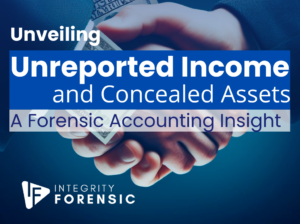Civil litigation can be a daunting and complex process. When disputes arise between parties, it is not always clear who is in the right. Oftentimes, assets may be hidden, concealed or disguised in order to avoid detection or recovery in legal proceedings. That is where forensic accounting comes in. Forensic accounting is the practice of using accounting, auditing, and investigative skills to uncover financial fraud, embezzlement, and hidden assets. In civil litigation, forensic accountants can play a vital role in helping lawyers and their clients uncover hidden assets and financial wrongdoing.
The importance of forensic accounting in civil litigation cannot be overstated. When parties are in a legal dispute, they may try to hide assets in order to avoid paying damages or settlements. This can include hiding assets in offshore accounts, using false identities, or disguising assets as business expenses. Forensic accountants can help uncover these hidden assets by analyzing financial records, tracing transactions, and using advanced investigative techniques.
One of the primary roles of a forensic accountant in civil litigation is to conduct a thorough investigation of the financial records of the parties involved. This can include analyzing bank statements, tax returns, financial statements, and other relevant documents. By examining these records, forensic accountants can identify discrepancies, inconsistencies, and other red flags that may indicate the presence of hidden assets.
Another key role of forensic accountants in civil litigation is to trace financial transactions. This involves identifying the flow of money between parties, and tracking the movement of funds through various accounts and financial institutions. By tracing financial transactions, forensic accountants can identify hidden assets that may have been transferred or disguised as legitimate business expenses.
In addition to analyzing financial records and tracing transactions, forensic accountants may also use advanced investigative techniques to uncover hidden assets. This can include using data analytics tools to identify patterns and anomalies in financial data, conducting interviews with relevant parties, and gathering evidence through surveillance and other means.
In conclusion, forensic accounting can be a powerful tool in civil litigation cases where there is suspicion of hidden assets. By analyzing financial records and transactions, forensic accountants can identify attempts to conceal assets and provide concrete evidence to support legal cases. While the practice may not be used in every case, it is important for attorneys and legal teams to be aware of its potential benefits and to consider using it when appropriate. By doing so, they can help ensure that clients receive the compensation they deserve and send a clear message that attempts to hide assets will not be successful.
At Integrity Forensic, we have a team of experienced forensic accountants to assist you. Call now for a free consultation: 855-673-9999 or send us a message at questions@integrityforensic.com.





